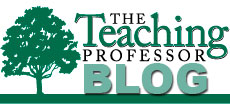The December issue of The Teaching Professor newsletter contains a piece highlighting a review of research article on humor. It’s so impressive I decided I’d mention of few of its features and findings in this post.
Read more ›CURRENT ARTICLE • November 18
OTHER RECENT ARTICLES
I was on the first floor of a college library, needing to get to a teaching and learning center on the fifth floor and standing in front of two elevators, but for the life of me I couldn’t find the call button. There was the large panel with the instructions not to use the elevator in case of fire and various key holes for use in emergencies, but no button. I looked elsewhere, around the edges of both doors. Still no sign of a button.
Read More ›We are all so busy. We race from task to task. We attempt to multi-task; dividing and depleting our energies. How many times do we arrive in class breathless with hardly a moment to think about what we have planned for the day? I harbor no illusions that a blog entry is going to change our lives, but I would like to use this one to reiterate the need to make time for reflection, for contemplation about what we do, and how and why we do it. The value of doing so is laid out clearly in a new book, A Teacher’s Reflection Book: Exercises, Stories, Invitations by Jean Koh Peters and Mark Weisberg.
Read More ›I must confess I still enjoy catalog shopping. I know how that dates me but at the end of the day, the last thing I want to curl up in bed with is my laptop. I particularly enjoy catalogs that include recipes. The King Arthur Flour catalog and Penzeys Spices are favorites. The fall 2011 Penzeys’ catalog pays special tribute to teachers because, company founder and owner Bill Penzey says, teachers aren’t feeling a lot of respect these days and they are being inappropriately blamed for our economic woes when, in fact, they do more to build the economy than anyone else. “Teachers are strong people, but their jobs are hard and have a way of using up that strength,” he writes.
Read More ›The November issue of The Teaching Professor newsletter contains highlights from a speech given by Diane L. Pike at the 2010 Midwest Sociological Society meeting and subsequently published in the reference below. It’s a great speech that identifies three dead ideas in teaching and the tyranny that results from holding those beliefs.
Read More ›I’m working on a lecture I’ll be giving at the University of the West Indies and have been thinking about the feedback we give students on their skill development. If you teach something like art or physical therapy or some sport, then skill feedback can’t be avoided, but if you teach something like calculus, history, management or biology where the emphasis is on the content, students don’t always get much feedback on the skills associated with content acquisition in those areas. Our feedback tends to focus on whether they have mastered the material. How they do that is a secondary concern or not an issue we deal with directly.
Read More ›Most students don’t read their textbooks as well as they should. It’s a topic we’ve dealt with before in this blog and because it’s pervasive and persistent, I keep my eyes open for any ideas, information or resources that instructors might find helpful. I found one this week in an issue of Teaching of Psychology. It’s an instrument developed to solicit student feedback on the textbook.
Read More ›The August 24 post, What Does Your Syllabus Say About You and Your Course?, in which I asked a series of questions designed to encourage revisiting the syllabus in terms of its role in setting course norms and establishing the tone of the course generated some interesting responses. I am always pleased when a post stimulates reaction, including disagreement. This is how we learn and grow as professionals. It also makes blogs worth reading, in my opinion.
Read More › At a recent workshop at the University of Wisconsin, Eau Claire, I asked participants to identify the one thing about participation they would most like to change in their classrooms. From a variety of items mentioned, we decided to focus on three. They are listed below along with a range of solutions suggested by the group. Some of the solutions apply to more than one of the problems.
At a recent workshop at the University of Wisconsin, Eau Claire, I asked participants to identify the one thing about participation they would most like to change in their classrooms. From a variety of items mentioned, we decided to focus on three. They are listed below along with a range of solutions suggested by the group. Some of the solutions apply to more than one of the problems.
I love the fact that some pedagogical journals still publish first-person reflections on teaching experiences. Many of the disciplined-based pedagogical periodicals have moved away from these accounts in favor of more empirical investigations. I regularly highlight research both here in the blog and in The Teaching Professor newsletter because I strongly believe teaching and learning would be improved if our practice was more evidence-based. But I also believe personal accounts of teaching experiences can be first rate scholarship. They can be thoughtful, insightful, and intellectually rich journeys filled with important lessons for both the author and the readers.
Read More ›




